Preschool education programs are constantly evolving. On the surface, it may seem like a playful world of blocks, crafts, and snacks for kids. Delve deeper, and you’ll find an intense, transformational journey shaping young minds.
Just as deep, well-established and steady foundations are needed to keep skyscrapers standing, a tranquil preschool environment fosters young children’s intense cognitive growth and development. At the heart of this hustle is a high-quality preschool program. Research shows that children enrolled in such programs tend to outpace their peers in cognitive and behavioural growth. So, how does quality play into the importance of a preschool education program?
Table of Contents
Interactive Curriculum
Much like a bustling metropolis, an effective preschool education program demands a dynamic curriculum. This curriculum transcends traditional academics by integrating play, social interactions, creativity, and exploration, fostering well-rounded development.
Teachers construct the core of a preschool curriculum upon the general knowledge and skill set that experts anticipate most young children to acquire. To advance and encourage children’s growth and learning, educators strategise and modify the curriculum by:
- Establishing learning objectives for children that are demanding yet attainable with guidance.
- Harmonising structured group tasks and teacher-led instruction with activities that pupils elect independently.
- Allocating ample time for children to engage profoundly in learning activities and experiences.
- Closely observing and reinforcing children’s areas of interest, abilities, and understanding.
Skilled Teachers
The bedrock of any preschool program is its teaching professionals. They are the pillars holding the structure, akin to the bedrock supporting a bustling city. Trained teachers, sensitive to specific needs and developmental stages of pre-schoolers, are the fundamental impetus of quality in these programs.
Parent Involvement
No preschool can prosper without active participation from parents. Think of parental involvement in education as the crucial groundwater that keeps land fertile. When parents get involved, the learning continues beyond the school, creating a consistent learning environment.
Small Class Sizes
Reminiscent of the precise measurements needed in proper skyscraper construction, researchers point out the prominence of small class sizes and optimal student-teacher ratios in effective preschool programs. Just as these numbers can indicate the severity of the effect of geographical changes, they testify to a child’s access to individualised attention in preschool spaces.
Engaging Physical Environment
The physical learning environment plays a weighty role, much like the land that supports buildings. An engaging, safe, and age-appropriate environment fosters learning while ensuring the children’s safety.
Regular Assessments
With the world around us constantly changing, preschools must maintain a proactive approach to assessment. This continuous evaluation helps identify each child’s strengths, areas of interest, and points that need additional support.
Forming Relationships With Students’ Families
The teachers cultivate trusting connections with their students’ families. In doing so, they demonstrate that they recognise your irreplaceable role as the primary influence in your child’s existence and, thus, work with you in harmonious partnership. This collaboration comprises:
- Paying attention to the ambitions and worries that families have regarding their children.
- Advocating for family involvement within the program through various means.
- Demonstrating respect for each family’s distinctive language and cultural heritage.
- Devoting effort to discover methods to converse in the native language of a family.
Conclusion
A high-quality preschool program is indeed buoyant, much like a landmass that doesn’t succumb to the pressures of its towering infrastructure. It creates an adaptable space for curious young minds. It accounts for individual attention, ensures a nurturing physical environment, and regularly evaluates every child’s progress.
Such a program ensures your kids aren’t merely static occupants of an educative space. Instead, they are the dynamic epicentre, their development consistently monitored and fostered – a place where your children’s futures are built to scale remarkable heights.
Appreciate it!

